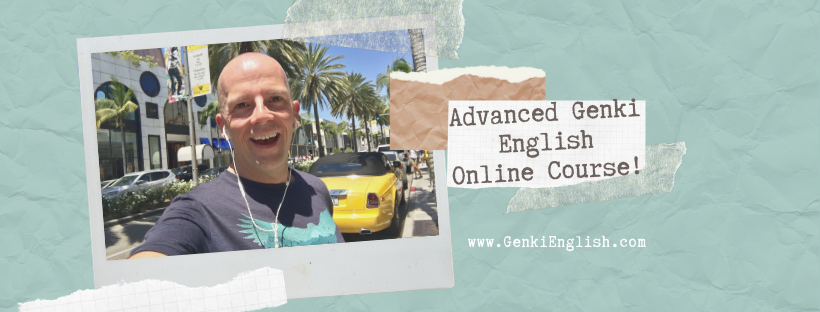Inspired by the amazing success of Lola’s students I’ve just updated the “Success Secrets of Learning English” article containing all the tips and tricks I use to learn foreign languages.
The original bilingual version is also available for Amazon Kindle.
Enjoy!
Success Secrets of Learning English
by Richard Graham www.GenkiEnglish.com
 Hello, my name is Richard. You are about to learn the secrets that will allow you to become fluent in one of the most amazing communication mediums on the planet, the English language.
Hello, my name is Richard. You are about to learn the secrets that will allow you to become fluent in one of the most amazing communication mediums on the planet, the English language.
You will learn the skills, hints and tips, but more importantly the way of thinking that will allow you to speak English to whatever level you desire. If you wish to do business, converse with friends, or simply to enjoy meeting other people, whatever your background or experience, putting these simple steps into place will dramatically increase your English ability.
They are the exact same ways of thinking that I myself have used to study Physics in French at a French university, and to speak in numerous TV shows and presentations in Japanese.
If you wish you could speak English better, or even if you know nothing at all and just want a head start, this book is what you have been waiting for, the key to making English something that you, yes you, can speak beyond your wildest dreams.
1. Realise that you can be great at English.
 Anyone can become great at English. You can become great at English. Your country of origin or race does not matter. Millions of Americans speak fluent English, yet thousands of them are biologically exactly the same as you. Where you were born does not matter. Most of the English speakers in the World today learnt English as a second, or even third language. Even in your country there are many, many highly proficient English speakers. Where you live does not matter.
Anyone can become great at English. You can become great at English. Your country of origin or race does not matter. Millions of Americans speak fluent English, yet thousands of them are biologically exactly the same as you. Where you were born does not matter. Most of the English speakers in the World today learnt English as a second, or even third language. Even in your country there are many, many highly proficient English speakers. Where you live does not matter.
Whilst going to live 5 years in Hawaii may make you fluent more quickly, in this age of the internet, TV and travel it’s quite possible to get fluent at English simply by living at home. Just look at how many foreigner speakers in your country get along so well without speaking the local language at all.
It’s not where you live, it’s how you think.
2. Realise that English is easy.
Do you think English is difficult? If you do you will never learn to speak well.
But what are you comparing this to? If you think that English is more difficult than your own language, then how can you know if you don’t speak English yet? The key to being good is to realise that English is easy. Is English brain surgery or quantum mechanics? No. It’s simply a foreign language, something spoken effortlessly by millions of people everyday without a second thought. Truly great speakers of English treat English as a secondary thing, not something to think about, and certainly not to worry about, it’s simply another skill, like riding a bicycle or driving a car. It is something you can achieve. And you can achieve easily. All it takes is a little effort and the right way of thinking. English is easy.
3. Do something you enjoy.
You must love to learn English. You don’t see it as work, but as play. To achieve this the key is to do what excites you, but do it in English. Do you have a passion for fishing, or fashion? The latest stock prices or the hottest music? What about your family or children? What gets you going? What’s the one thing that if taken away from your life would have the biggest influence on you? Now imagine reading, listening and talking passionately about that subject, but in English.
4. Set a goal
 How good do you want to be? Without a goal, however hard you try you will never achieve anything. You need a decided, specific, written goal. Maybe you have one already? Maybe you need a certain level of English for a promotion or pay rise? Maybe there is a special girl or boy you want to speak to in English? Maybe you have a big business trip coming up? Set that as your goal. See yourself with that promotion, with that pay rise, with that boy or girl or talking effortlessly during that business meeting. Set the goal, work everyday towards it and you will achieve it.
How good do you want to be? Without a goal, however hard you try you will never achieve anything. You need a decided, specific, written goal. Maybe you have one already? Maybe you need a certain level of English for a promotion or pay rise? Maybe there is a special girl or boy you want to speak to in English? Maybe you have a big business trip coming up? Set that as your goal. See yourself with that promotion, with that pay rise, with that boy or girl or talking effortlessly during that business meeting. Set the goal, work everyday towards it and you will achieve it.
What if you don’t have a goal already? Remember the previous point, talk about something you love in English. Imagine how long you could talk about your hobby or passion in your own language. Imagine you are in a room with like minded people, all eager to hear everything you know about your passion. Now imagine the exact same scene, but this time you are talking just as much about your passion in English. This is your new goal. However much you can talk about your passion you can now do it in English.
5. See yourself in the future.
Or if you don’t have a hobby or passion, try this idea. Close your eyes. See yourself in the future. You are fluent in English. You are talking to someone. Can you see? Who is this person? The American president? The president of your company? The Queen? David Beckham? You are laughing and joking. You understand everything they say. They understand everything you say. You are having a thoroughly enjoyable time. You are speaking fluent English. Look in the mirror. This is you. Keep this image in mind; this is your new goal. Work everyday to make it come true.
6. Don’t mind what other people think
 In my first couple of days in one new country I was out with some English friends. There were some local people in the place, and naturally we were keen to meet some of the locals and have a chat. We were quite lucky in that one of the locals was not only really fun and friendly, he also spoke quite good English. When we had finished it was decided we would go to another place. So we all got on the train. The shocking thing was that this fun, friendly, English speaking business man suddenly told us not to speak English to him on the train. He was embarrassed that other people may hear him speaking English! Wow.
In my first couple of days in one new country I was out with some English friends. There were some local people in the place, and naturally we were keen to meet some of the locals and have a chat. We were quite lucky in that one of the locals was not only really fun and friendly, he also spoke quite good English. When we had finished it was decided we would go to another place. So we all got on the train. The shocking thing was that this fun, friendly, English speaking business man suddenly told us not to speak English to him on the train. He was embarrassed that other people may hear him speaking English! Wow.
Now luckily things have changed a lot over the past few years. But some people still believe that they should not speak English because other people think of them as being a “show off”. There is only one reason that people would think like that: they are jealous. Admittedly if you went around saying “I’m great at English, look how bad you are!” then they probably have a point. But people who say bad things about people who speak English are merely jealous that they cannot speak themselves. Secretly, deep down they respect you for speaking English and they indeed want to become like you themselves. Even the harshest critic really respects you for speaking English and wishes to be like you. So don’t hide your lantern under a bushel, if you have the chance, use your English. This is your life and you alone decide how and when you speak and in what language.  Don’t let what other people think stop you achieving your potential. Speak up and be proud to speak English!
And don’t think that “being shy” is OK. It’s not. In every country we love winners and people who have special skills. Look at the Olympics when athletes win medals, everyone appreciates their special skillsã€applauds their success and wishes them well. Or when scientists win Nobel prizes, again everyone is proud of what they achieved, looks up to them and feels inspired to become great themselves. It’s the same with you and English. If you can speak English and the people around you see this, then they will look up to you, admire and respect you. They’ll be proud to know you and the people around you will be inspired by your abilities and want to become great speakers themselves. Be a role model, be an inspiration for others.
7. Take responsibility
 We all start from different points in life. Some of us are born rich, some are born poor. Some have influential parents, some have no parents at all. Some have been seemingly been given great chances on a plate, some have had to work extra hard for everything they have achieved. This is life. And there’s nothing to do but accept it. If we constantly say “yes, but he was born in America so of course he can speak English”, or “Yes, but he went to the best university and had the best teachers” then we are blaming other people. Blaming other people is to make excuses, and making excuses is to open the path to failure. First we must take responsibility ourselves. How good you are at English is all up to you. There are millions of people in underdeveloped countries who have no food, no education and no resources, but they simply decided to learn English and did it. They took responsibility and took action. You are exactly the same, if you take responsibility and take action you will succeed. Maybe you feel you have no time? That you are too busy? But who decides how you spend your time? Don’t blame other people. How you choose to spend your time is entirely decided by you. So take responsibility and take control, acknowledge that you control what, when and how you do things, and make the best use of your time to achieve your goals. Take time where you can, five minutes after taking the kids to school? A 20 minute commute to work? An extra 10 minutes while eating lunch? Your time is yours. Five minutes before breakfast? Your time is yours. Everything starts with you. You are the master of your destiny, only you can determine how good you wish to become. Decide today you wish to be brilliant. Take responsibility. Make it happen. Become a brilliant speaker.
We all start from different points in life. Some of us are born rich, some are born poor. Some have influential parents, some have no parents at all. Some have been seemingly been given great chances on a plate, some have had to work extra hard for everything they have achieved. This is life. And there’s nothing to do but accept it. If we constantly say “yes, but he was born in America so of course he can speak English”, or “Yes, but he went to the best university and had the best teachers” then we are blaming other people. Blaming other people is to make excuses, and making excuses is to open the path to failure. First we must take responsibility ourselves. How good you are at English is all up to you. There are millions of people in underdeveloped countries who have no food, no education and no resources, but they simply decided to learn English and did it. They took responsibility and took action. You are exactly the same, if you take responsibility and take action you will succeed. Maybe you feel you have no time? That you are too busy? But who decides how you spend your time? Don’t blame other people. How you choose to spend your time is entirely decided by you. So take responsibility and take control, acknowledge that you control what, when and how you do things, and make the best use of your time to achieve your goals. Take time where you can, five minutes after taking the kids to school? A 20 minute commute to work? An extra 10 minutes while eating lunch? Your time is yours. Five minutes before breakfast? Your time is yours. Everything starts with you. You are the master of your destiny, only you can determine how good you wish to become. Decide today you wish to be brilliant. Take responsibility. Make it happen. Become a brilliant speaker.
8. Only think positive thoughts.
Just like driving a car, our thoughts are self fulfilling, whatever direction we look at when driving, or think about during the day, is the direction we will go. Successful language learners always look on the positive side of things. They see a language as something that can be mastered, one step at a time. If along the way we make mistakes, or lose faith, it does not matter as long as we continually look forward. See the goal in your mind and head towards it. However, sadly many people don’t do this. Instead of focussing on the good things, they focus on the bad. They continually think of mistakes they have made, they worry that they may embarrasses themselves, they believe that English cannot be learnt, they believe they won’t be understood. And true enough if this is what they think of everyday then this is what happens. But you are different. You think positive thoughts everyday and you head in the positive direction. When you make mistakes, you learn from them and move on. When you see a new challenge, new people to speak to, new words you don’t know, you look forward to tackling them, you know that people will respect you for trying, even if you do make mistakes. You know that English is something you can do. You know that even if people don’t understand what you say the first time, if you try often enough they will indeed understand. New things to learn are a challenge to be relished. You look forward to situations you cannot handle, so that you may learn how to make them your own. Thinking only positive thoughts, brings about only positive results.
9. A little a day
Research in other countries shows that instead of a big study session once a week, a little everyday is much more effective. Get in to a routine and don’t allow your mind to forget what you have learnt. See everyday as a chance to add something extra to your English potential. Make it a routine. Like learning to play baseball or to ride a bike, or a little exercise, whatever you do everyday, you get good at it. Do a little English everyday and you will get good at it.
10. Listen as you move
 Get as many English Language courses, podcasts and audios as you can. Listen to them all the time. “But I’m too busy!” you say, and I quite understand! That’s why I recommend listening to them on your way to work or school, either in the car or your phone. It’s your time, use it. Do it everyday and you’ll soon see how much you can learn.
Get as many English Language courses, podcasts and audios as you can. Listen to them all the time. “But I’m too busy!” you say, and I quite understand! That’s why I recommend listening to them on your way to work or school, either in the car or your phone. It’s your time, use it. Do it everyday and you’ll soon see how much you can learn.
Remember, if you listen to lots of English audios everyday, you’ll get very good at listening. To get very good at speaking, make sure you speak out loud with
the recordings. Which do you want to be? Someone who is good at listening to English? Or someone who is really good at both listening and speaking?
11. Be careful of “weird English”
When you buy your books or courses, buy lots of different materials from lots of different companies. The reason is that many courses are written by people who don’t speak English and hence they contain lots of mistakes. But if you buy & listen to lots of different materials, you’ll soon figure out which bits of English are real, and which are not! Learn English that is cool, so that other people are so impressed they say “wow!” when they hear you speak.
12. Every step counts.
Realise that learning English everyday is like putting pennies in the bank. Every time you save a few pennies, the amount in your account increases and increases. English is the same, every time you do even just a little bit it adds and adds to how good you are. What if instead of 5 minutes everyday you did 10? What about 20 instead of 10? Every minute is a minute invested. Think how those minutes of study are building up, penny by penny, minute by minute to make you a wonderful speaker of English.
13. Work smart, not hard – part 1
 One of the biggest shocks that people have about high school English is that although everyone has studied English at school, hardly anyone speaks it. I’m sure you had English classes for many years in high school, yes? And can you speak fluent English? Just imaging if you had studied your own writing for 6 years in Elementary School and couldn’t write a single word! So why can’t you speak English? Well, the reason is that you were working hard, but not smart. You had the wrong goals and targets in mind. Up until now the High School English system was built on ideas from the Victorian period. In that time the target wasn’t communication English, because there was no-one to communicate with! The aim then was to learn about foreign knowledge. People would read books in German or English or Dutch about arms, or medicine or engineering. They would dissect the grammar and translate it into for everyone to read and understand. If you think about your high school English, it was probably something just like that. And in that respect the world has succeeded. But it’s not the Victorian period anymore, it’s now about communication. Unfortunately the school system hasn’t caught up yet, but it will! So realise that what you learnt in high school won’t really help you. But don’t feel bad about the time you spent, you were just working towards an unsuitable goal. And now things are different, now you have a new goal, a new motivation, and a new determination to achieve that goal!
One of the biggest shocks that people have about high school English is that although everyone has studied English at school, hardly anyone speaks it. I’m sure you had English classes for many years in high school, yes? And can you speak fluent English? Just imaging if you had studied your own writing for 6 years in Elementary School and couldn’t write a single word! So why can’t you speak English? Well, the reason is that you were working hard, but not smart. You had the wrong goals and targets in mind. Up until now the High School English system was built on ideas from the Victorian period. In that time the target wasn’t communication English, because there was no-one to communicate with! The aim then was to learn about foreign knowledge. People would read books in German or English or Dutch about arms, or medicine or engineering. They would dissect the grammar and translate it into for everyone to read and understand. If you think about your high school English, it was probably something just like that. And in that respect the world has succeeded. But it’s not the Victorian period anymore, it’s now about communication. Unfortunately the school system hasn’t caught up yet, but it will! So realise that what you learnt in high school won’t really help you. But don’t feel bad about the time you spent, you were just working towards an unsuitable goal. And now things are different, now you have a new goal, a new motivation, and a new determination to achieve that goal!
13. Work smart, not hard – part 2
So what if you decide to work 20 hours a day on English. Will you get good? Well, what if you spent 20 hours a day practising baseball? In the beginning you might see some improvement, but after a while you’ll simply get tired. Although every minute adds up, every minute has to count. Instead of simply focussing on the time, or seeing how many audios you’ve listened to, work smart instead of hard. 5 minutes of good concentrated practice is worth more than a hundred hours of tediously studying grammar. You time is important, you’ll never get it back, so work smart, not hard.
14. Take every chance you have.
 Every chance is a gift; you’d be a fool not to take it. If you are asked to speak to some people in English, if you see someone lost on the street, if you are on holiday and want to order some food. Take the chance and do it. Speak English. Don’t give into the easy path of being embarrassed or afraid. This is the new you and you take every chance you get. Who cares if you make mistakes, you will have learnt something from the experience. Taking every chance you get increases your confidence. And increased confidence leads to more chances and opportunities appearing. People will see how you are eager to help people, you will be asked to help out more and people will respect you for it.
Every chance is a gift; you’d be a fool not to take it. If you are asked to speak to some people in English, if you see someone lost on the street, if you are on holiday and want to order some food. Take the chance and do it. Speak English. Don’t give into the easy path of being embarrassed or afraid. This is the new you and you take every chance you get. Who cares if you make mistakes, you will have learnt something from the experience. Taking every chance you get increases your confidence. And increased confidence leads to more chances and opportunities appearing. People will see how you are eager to help people, you will be asked to help out more and people will respect you for it.
15. Get an Electronic Dictionary
Get an electronic dictionary or app. The key is to take it with you everywhere you go. Whenever you hear or see a new word, put it in the memory. Then when you have some free time, on the train or waiting to pick the kids up from school, test yourself with the “memory function”. The dictionary will flash up an English word at random, and you have to guess the meaning. The best thing is that because you carry the electronic dictionary with you everywhere you go, you make emotional connections with the words. For example when you see a word you think “Oh yes, that’s the word that I heard at work last week” or “Oh yeah, I first heard that word at the end of year event!”. This way the words become your own.
16. When you wake up in the morning…
This is another trick that I use to learn languages and you can use it too. You know in a morning and you wake up, you think to yourself “What time is it? Quick, I’ve got to get a shower, then some breakfast, then that meeting at 9 o’clock!”. Well, I used to do that in the new language. Take a bit of time to figure out the things you want to say, learn them and then use them everyday. The best thing about this idea is that even if you make mistakes no-one will ever hear them! If you find one day that you want to say something and you don’t know how to say it in English, just look it up. Either use your electronic dictionary or ask a teacher or friend.
17. Don’t read at first
Audio and video are always better than books to study from as you can hear the right pronunciation. If you see new words in a book, it can be difficult to know how to say them. Usually this means your pronunciation will be really bad.
Some people it’s a “starting point”, something to help you. It usually doesn’t work as you usually never get the sound correct just by looking at the symbols. Some people say “but it’s close to correct English”. But that’s still no good. For example, in math you wouldn’t say “1+6=8”, would you? Why not? Because it’s wrong. But it is close!   So at first don’t read, use audio and videos! Practice everyday and you’ll have no problems!
18. Going to bed at night.
 This is another great trick that people have always used to practise writing. But here we’ll use it to get your speaking to a fantastic level. All you do is grab yourself a tape player or audio recorder and speak into it all the things you did today. If you can’t say something, look it up. It’s great practise and is a great source of materials if you have English lessons, simply bring a copy along with you and get the teacher to go through it. Remember, a little everyday is your key to great English skills.
This is another great trick that people have always used to practise writing. But here we’ll use it to get your speaking to a fantastic level. All you do is grab yourself a tape player or audio recorder and speak into it all the things you did today. If you can’t say something, look it up. It’s great practise and is a great source of materials if you have English lessons, simply bring a copy along with you and get the teacher to go through it. Remember, a little everyday is your key to great English skills.
19. Be honest, don’t lie.
If someone says to you “Wow, you speak great English!”. Don’t turn round and say “Oh no, I don’t speak English well!”. That’s a lie! You do speak English well! Say “Thank you”. It always surprises me that most people say they speak very bad English, but if I simply say “hello” in their language they start saying how well I speak it! I’m sure you can say much, much more than “hello” in English, so you must be good!
20. Get everyone involved
Of course learning English by yourself is fun, but why not share that fun with other people? Make it a house rule that from 7 till 8 PM people can only speak English. If anyone speaks another language by mistake they have to put some money in a special savings box. You can use that money for a special treat. Or if you have kids, if they keep asking for things like burgers or candy, only give it to them if they can ask in English. Or at work, make one of your daily meetings in English. If everyone is working smart at getting good at English, it’s even easier to learn.
21. Speak as much as you can, but don’t become a groupie!
Now that you’re listening to audios and speaking English everyday, you are getting really good. Now to get to the next level you also need to practice real English with lots and lots of people. Don’t worry, it’s easy! One way is to use the internet. Look online for “language exchanges”.
Or see if you can help people in your town or city. When I live in other countries I usually can’t speak the language in the beginning and it is hard to do even simple things like shopping or paying a gas bill. But there are always lots of people who help me out, even if the only English they can say is “hello”. It really means a lot to me when people make an effort to communicate and help me.
In this way I make lots of really great friends, and you can too. If there are new people in town, go and visit and see if there is anything you can help with. Or ask at your community centre if there are groups or classes that help foreign visitors.
Or you could try offering free languages lessons to new visitors. I’m always looking for language teachers when I move to a new country!
The only thing I would ask is, don’t become a “Groupie!”. Just like with everyone else, talk to someone if you like them and want to talk to them. Don’t just see English speakers as a free English lesson. We are people too! But if you put in a little effort, you can help people out, make lots of friends and learn lots of English.
22. Take your holidays abroad. It could be cheaper!
 I always say this to people and they always say “It’s too expensive!”. Not always, check online and you might find some amazing deals.
I always say this to people and they always say “It’s too expensive!”. Not always, check online and you might find some amazing deals.
If you can, try and avoid package tours. With a package tour, you are inside a kind of “bubble” where you don’t have to speak English. What you should do is to just book a flight and hotel. “That’s too scary!”, you may say. But don’t worry, that’s what makes it fun! Don’t believe all you hear about foreign countries being dangerous, they’re not. For example, in England all we hear about other countries is of earthquakes, tsunamis, typhoons and volcanoes. If you only read the English news you’d think the World was very, very dangerous place. But it’s not like that really, is it? And it’s the same with other countries. Just like being at home, as long as you don’t do anything too stupid, you’ll be fine. Enjoy the World, because it’s a fantastic place. Plus now you have the confidence and English skills to enjoy it even more.
23. Forget writing
You don’t need to learn to write. How much of your daily communication is speaking / listening? How much is reading / writing? That’s the same balance you should use when learning English. For most people this means over ninety percent of the time should be speaking and listening. This is great news, because it means you can learn a whole lot more in a much shorter space of time. Just concentrate on the important points of speaking and listening.
24. For reading do phonics
If you do wish to read English, for example to read road signs or maps etc, there is a really easy way. It’s called “phonics”. Now this might sound complicated, but it’s very simple. All it means is that instead of learning the names of the letters, for example “Ay, Bee, See”, you learn the sounds the letters make. Have a play here (GenkiPhonics.com) and you’ll see what I mean. Once you’ve done the basic sounds, which only takes a few afternoons, you’ll be able to read eighty percent of English words. Which isn’t too bad, is it?
25. Watch one TV programme a week in English
 Thanks to satellite and bilingual TVs, as well as the internet, it’s now really easy to watch programmes in English. But don’t start off by saying “right, I’m only going to watch TV in English from now on!”. Just like swimming, you don’t start by jumping in the deep end of the pool. Start off in the shallow water, just watch one programme a week in English, then gradually move on, and eventually you’ll be swimming on your own, and be able to watch anything in the original English. Don’t worry if you don’t understand it all, I only understand 80% of some American TV shows. With practice, just a little every week, you soon figure out what the new words mean, and eventually you’ll be able to watch any programme or movie you like in English, with no problems.
Thanks to satellite and bilingual TVs, as well as the internet, it’s now really easy to watch programmes in English. But don’t start off by saying “right, I’m only going to watch TV in English from now on!”. Just like swimming, you don’t start by jumping in the deep end of the pool. Start off in the shallow water, just watch one programme a week in English, then gradually move on, and eventually you’ll be swimming on your own, and be able to watch anything in the original English. Don’t worry if you don’t understand it all, I only understand 80% of some American TV shows. With practice, just a little every week, you soon figure out what the new words mean, and eventually you’ll be able to watch any programme or movie you like in English, with no problems.
26. Set goals and do things one at a time
Earlier on we talked about goals. Can you still see the image in your mind of you speaking to that famous person in English? Can you still see you laughing and joking in English? Good. The thing is that you can only aim for one goal at a time. Some people say things like “Oh, this month I’ll do English everyday, I’ll exercise and lose 10 kilograms and I’ll learn how to cook Thai food”. But you can only do one thing at a time. Make English your number one priority. Then when you have achieved that goal, make all your other dreams come true.
27. You can do it!
Confidence is the key. You are special. You can do it. You are a very clever person, after all you’ve had the energy to keep reading right to the end of this article. It’s not brain surgery, it’s not genetic engineering, it’s just English, and you can do it. Stay with it, just five minutes a day and you will become better than you every imagined. It’s all up to do. Decide to become a great speaker. Believe it will happen, and it will.
28. Do it today!
 So you’re all geared up ready to be able to speak English today? Well, do it! Don’t wait until tomorrow. Tomorrow never comes! Don’t think; do it! There’s never been a better time for you to start. Whatever you are doing after reading this book, do it in English. If you are going to the shops, get online, sing up with a great teacher or for a great course. If you are in the house, put the TV on in English. If you are planning what to make for dinner, think about what you would like – in English.  The best time to start is right now! You are the new you, the new you speaks great English and the new you starts now!
So you’re all geared up ready to be able to speak English today? Well, do it! Don’t wait until tomorrow. Tomorrow never comes! Don’t think; do it! There’s never been a better time for you to start. Whatever you are doing after reading this book, do it in English. If you are going to the shops, get online, sing up with a great teacher or for a great course. If you are in the house, put the TV on in English. If you are planning what to make for dinner, think about what you would like – in English.  The best time to start is right now! You are the new you, the new you speaks great English and the new you starts now!
Enjoy and be genki,
Richard
http://www.GenkiEnglish.com
And if you want to learn more advanced English directly from me, Â have a look at my C1/C2 Level Advanced Genki English course


Hi!
What a great piece of writing!!!
I do what I love and like with English and this is a very good starting point for me. In addiction, I have always loved reading books written in their originale
languages. Also, I know very well that it’ s my stinking thinking which gets in the way at times. I really look forward to embarking on this new adventure. So I d like to thank you for this long article which is so energizing and empowering at the same time.
Now here I add one of my favourite slogans: if you work It It works and therefore I bet once the routine has been established, it would take care by itself as it always the case once you haven
introduced good habits in your life which make it easier and also more fruitful and enjoyable. It must be as such even this time. So I’ m eager to start the advanced course very soon….within less than two weeks now.
Have a great day
Marina
In addition…..this has become like an addiction but a lovely one. Guess what? I m less scared of making mistakes than I used to.
Let s laugh…addition addiction…It works.
Marina
1- remember myself at the age of 26 entering English speaking club with my 16 years old brother, having background of 9 years of studing English in school and University and after that remembering 5-6 words as map, mother, table… I was so frustrated to say even these words…
English is easy. – without doubt. Just don’t forget to use or practice it every day! 🙂
Only positive thoughts – totally agree.
A little a day – true saying. A little English a day wind your troubles away!
To have a clear aim – it is said million of times. So, it seems it’s time for me to finally have one. 🙂
10 – Yes, plus the more you read the better you read and the more you write the better you write!